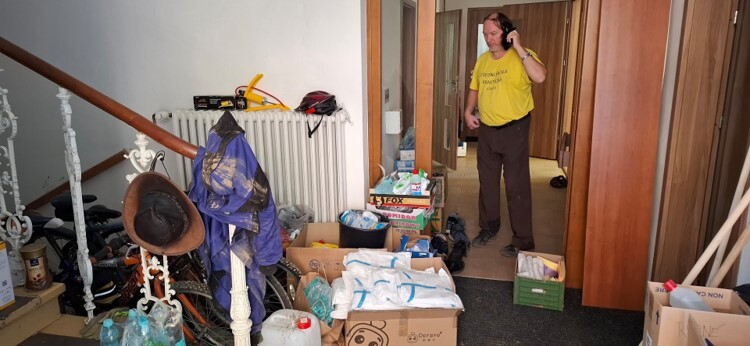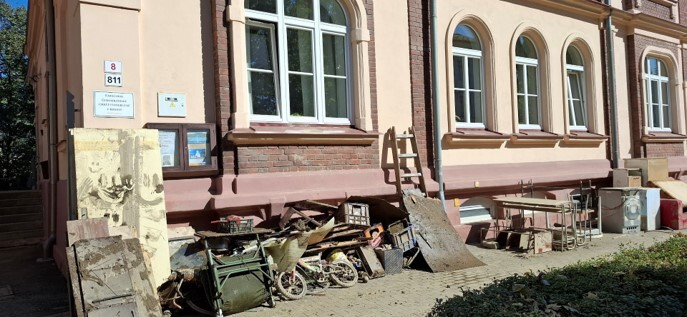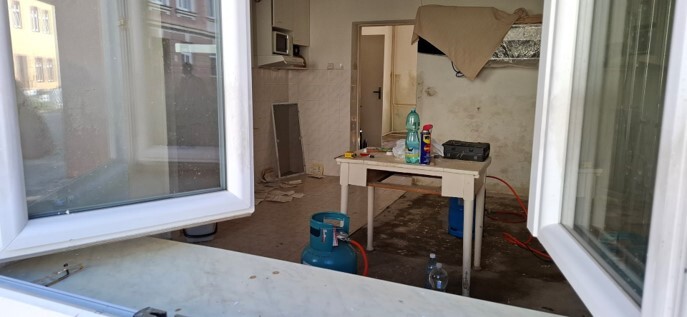Church helps people affected by disaster
The church and its Diaconia are helping the people affected by the flood disaster. Martin Balcar, head of the church office, tells us more in an on-site report.
To go or not to go? Will I be just another bystander? That was the main question on my mind on Thursday, 19 September, when we were asked to attend a meeting with German donors for the affected families in Jeseník.
No. The flood also affected our parishes - in Krnov it flooded the cellar of the manse, in Bruntál the annex. In Opava, the leaking ceiling was compounded by neighbourhood help for people who either come to the congregation or live nearby. The day after the flood, the first volunteers travelled there, mostly friends...
We also discovered eight driers in the church storerooms that have served communities here and there in various emergencies. We bought what was missing in North Moravia - construction lamps, anti-mould agents, some chocolate for the volunteers and drove to Opava and Krnov with my wife. The main thing is not to stand in the way, greet the flooded local people from the communities, support them with the offered help and leave again when we no longer have shovels or brooms in our hands.
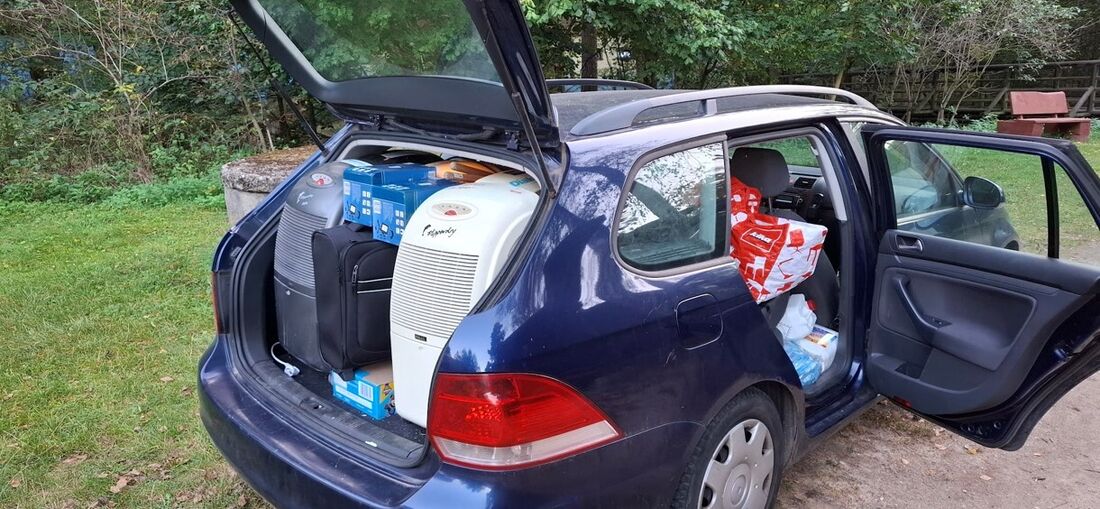 Eight dryers and construction lamps for the communities in Opava and Krnov
Eight dryers and construction lamps for the communities in Opava and Krnov
You don't notice anything from Prague to the centre of Opava. ‘You can only see the trigger behind the Breda shopping centre, it's two worlds apart,’ says Opava minister Pavel Janošík. ‘The Opava has burst its banks, friends from Olomouc are helping one of our sisters, we're bringing her coffee, you can come with us.’ We see an incredible amount of rubbish on the streets, you know that from the media... There's no need to write that. Generators are howling because the power is still out somewhere, clearing vehicles, heavy equipment and firefighters are everywhere.
We meet Kateřina carrying brooms from the congregation office. Opposite her are her friends from the street. ‘How are you doing?’ asks Kateřina. ‘Yes, luckily we're together, but everything's gone.’
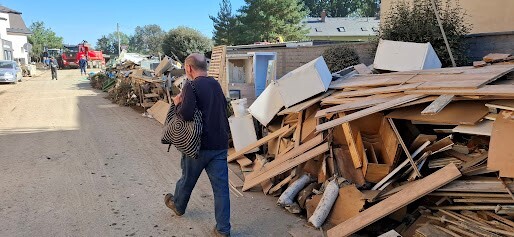 Minister Pavel Janošík on the streets of Opava
Minister Pavel Janošík on the streets of Opava
I think it's best if I keep quiet here and just support the people. A collection is really the best thing you can do. And if I don't pick up a broom, I'd rather not be here. People are vulnerable, exposed, in their pyjamas, and it's not good to disturb their intimacy. I am grateful for the volunteers from our congregation of Olomouc who came and helped immediately.
We say goodbye to the Janošíks by saying that the church wants to help the congregation and the people in the region not only in prayer, but also in a very practical way - financially.
We are travelling to Krnov. We were already told in Opava that Krnov is a ‘different level’, but it is only when we see the destroyed town that we realise that this is true. At the first roundabout there is a construction container in the middle of the road. Nothing unusual in ‘modern’ Krnov. Minister Štěpán Janča greets us in the manse - with his phone constantly to his ear, he explains where the volunteers, who come from neighbouring congregations, are to be housed in the presbytery. There are several dozen of them. Although it is not an official base, he has people here and sends them wherever they are needed, depending on local needs. In twos or threes to families. To friends and their friends, to other neighbours - wherever. Spontaneous and yet well organised.
‘I'll take you to the Mareks in Libušina Street, they'll be happy,’ he says, adding that we're going to visit the former lay curator, Jiří Marek, whose house was flooded. When we arrive at their house, we see the devastation... and a smiling Marek family. I don't understand. And again I don't know what to say, because in their street people have lost a lot. I see a soaked hymnal on the street below the window. The thought of biblical texts about transience finds a real image...
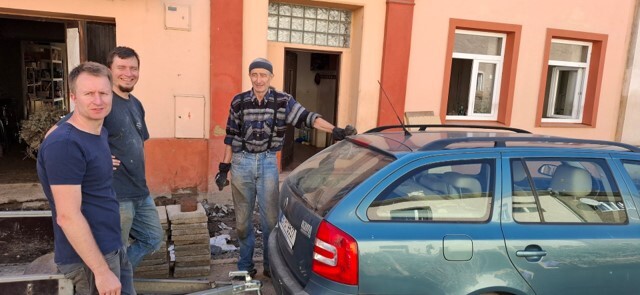 The Mareks in Krnov in front of their house - the water rose to half the height of the windows
The Mareks in Krnov in front of their house - the water rose to half the height of the windows
Our last stop is in the village of Brantice with the current lay curator of Krnov congregation, Marek Wdówka. Also flooded, but, as he says, ‘fortunately in an old German house with a stone foundation’. He smiles, greets us and is perhaps pleased to see us. And he tells us about the wave that swept through Brantice at around 60 km/h between three and five o'clock on Sunday. And even in this situation, brother is grateful for the presence of God. On the way to him, we saw a badly damaged house. On the way back, it was no longer standing. The fire brigade had demolished it in the meantime. That is the reality here. It's as if every minute of today was a day under normal circumstances.
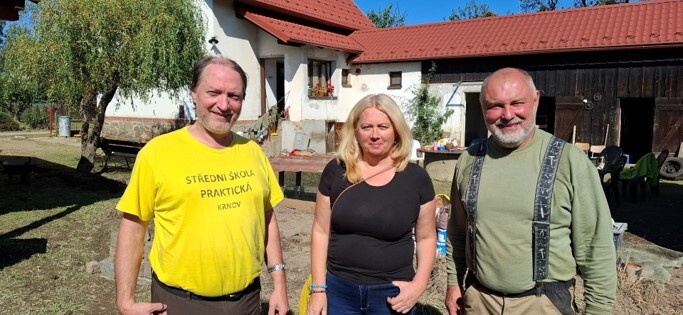 In Brantice (from left: Štěpán Janča, minister of the Krnov congregation, Eva Balcarová from the Central Church Office and Marek Wdówka, lay curator)
In Brantice (from left: Štěpán Janča, minister of the Krnov congregation, Eva Balcarová from the Central Church Office and Marek Wdówka, lay curator)
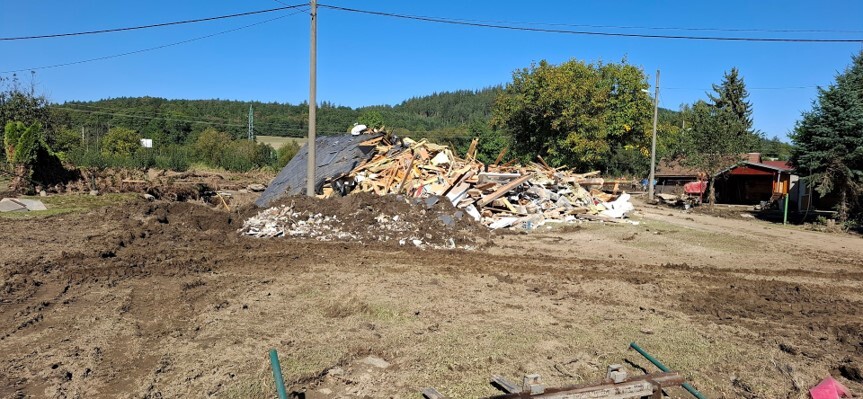
One of the houses in Brantice just a few minutes after demolition
We did not meet the German donors from Diakonie Katastrophenhilfe (DKH) in person - they were staying in Jeseník, which was closed to visitors from other regions that day, and there was no point in standing in their way. It is important that they are now helping the Diaconia.
Words are nice, now it's time for action. All of us who were not directly affected can now help - it is still possible to help as a volunteer with the Diaconia on the ground, it is also possible to send money to the places. In addition to the money, there is certainly also plenty of room for prayer. For strength for all those affected, for the wisdom of those who decide on the aid, for nature and creation.
On behalf of myself and the church leadership, I would like to thank everyone who is not giving up, who is helping and who is sending donations so that those affected can get back on their feet more quickly. Because this is not the end!

